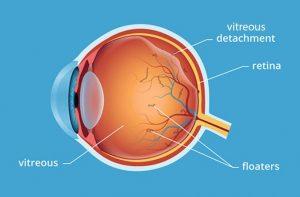Floaters and Flashes
Floaters
Floaters are tiny clumps of gel that form in the clear, jelly-like substance inside the eyeball known as the vitreous humour. They appear in your field of vision as tiny specks or clouds moving. The floaters move across your field of vision as your eye moves and if you try to look directly at them the floaters may seem to disappear. Floaters are particularly visible when looking at a light-colored area, such as a blue sky. These images are actually inside your eye even though they appear to look like they are at the front of your eye. Floaters do not have a specific shape and may appear as small dots, circles, clouds, cobwebs or lines across the vision.

The most common cause of floaters is shrinking of the vitreous jelly at the back of the eye due to ageing. This may pull away from the back of your eye causing clumps or strands.
Less common causes can be inflammation within the eye, or changes in the tear film. A detailed examination by an eye specialist of the front and back parts of the eye will determine the cause.
Flashing Lights
Sometimes, floaters can be associated with what appears to be flashing lights which look like flickering fluorescent lights. If the vitreous is pulling on the retina it will stimulate the nerve cells, causing flashing lights.
Flashing lights can be a symptom of Retinal Detachment.
Flashing lights can also be caused by:
- Vitreous humor pulling at the retina, when moving or turning your eye quickly
- Migraine, either with or without associated headaches
- Postural hypotension – getting up quickly from a kneeling, sitting or lying position resulting in dizziness and vision disturbance
- High blood pressure
As the vitreous gel shrinks, the retina can tear and this is a serious condition. A tear in the retina can appear as a new floater. Retinal tears can also lead to Retinal Detachment, which can cause vision loss. These can be treated with laser ‘spot welding’ treatment or if extensive may require surgery. Retinal Detachments typically require surgical treatment.
Important Notes
- You should also arrange a referral from your General Practitioner or Optometrist.
- Call the Launceston Eye Institute for an appointment with your Ophthalmologist if you experience flashes or floaters.
- When you come for your appointment, please arrange alternate transport as your eyes will be dilated allowing the Ophthalmologist to check your retina for any damage.
